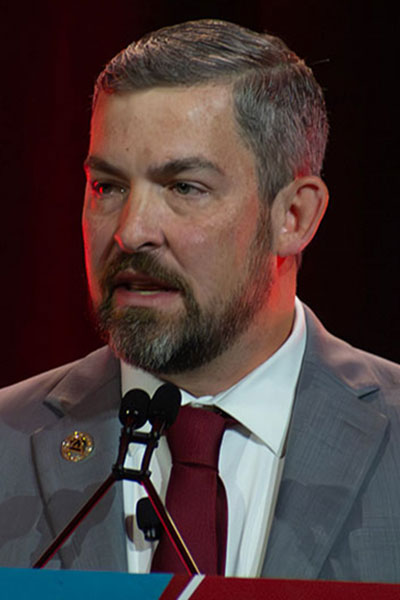Diabetes can be a tough diagnosis for anyone, but it can be particularly difficult for men. Just ask actor, comedian, and philanthropist Anthony Anderson, who was diagnosed with type 2 diabetes at age 25.

“As men, we will take our cars in to change the oil every 3,000 miles, but we won’t take ourselves to the doctor for a check-up,” Mr. Anderson explained to American Diabetes Association® (ADA) Chief Executive Officer Charles Henderson during a sit-down conversation on Saturday morning, June 21, at the 85th Scientific Sessions. “I subsequently lost my father to complications of diabetes, and I didn’t want that to happen to my children, to other families within our community. I’m sharing my story of this disease, and hopefully that will motivate people to go to the doctor, in particular Black men. That’s something my dad never did and I was falling into as an adult.”
The “fireside chat” was part of the session, ADA Chief Executive Officer Remarks; President, Health Care & Education Address; and Outstanding Educator in Diabetes Award Lecture, which also featured remarks from Joshua J. Neumiller, PharmD, CDCES, the ADA’s President for Health Care & Education.
Like many people, Mr. Anderson had an epiphany leading up to his diabetes diagnosis. He was feeling unusually tired, tired to the point of falling asleep in the middle of the day, with an unquenchable thirst. The epiphany was realizing he had emptied a 5-gallon water bottle between 11:30 p.m. and 2 a.m.
“That’s when I knew that something wasn’t right with my body,” Mr. Anderson said. “I went to the doctor, they ran some tests, and 5 minutes after I left the hospital, I got a call from the doctor saying, ‘You have to come back, right now.’ That’s when I was faced with the choice of am I going to live with this disease or am I going to die from it? I made the choice to live with it as best I can. It’s my lifelong journey to share information, to give my testimony, and to encourage people to go to the doctor on a regular basis.”
The Critical Role of Collaboration to Achieve Diabetes Outcomes

In his address, “It Takes a Village—Multidisciplinary Collaboration to Optimize Diabetes Care and Education,” Dr. Neumiller, the Allen I. White Distinguished Professor in the College of Pharmacy and Pharmaceutical Sciences at Washington State University, said providing team-based diabetes care and educating primary care providers has never been more important.
“Addressing the needs and challenges of people living with diabetes and obesity requires an all-hands-on-deck approach because the need is profound,” he said, adding that many people with the disease fall short of achieving therapeutic targets to reduce their risk for diabetes-related complications.
Primary care manages, and will continue to manage, the vast majority of Americans living with diabetes because the nation has only about 9,000 endocrinologists for the more than 20% of the U.S. population (approximately 67 million people) living with obesity in 2023.
Deficits in medication management and education are also key concerns in diabetes care, Dr. Neumiller noted. The CKD-Medication Intervention Trial of an in-home, pharmacist-led medication management intervention for individuals with diabetes and chronic kidney disease (CKD), found that 92% of individuals had at least one medication-related problem. Patients typically exhibited important knowledge deficits about both their chronic conditions and prescribed medications.
The evolving paradigm of diabetes management from glucose-centric to metabolic management expands the need for team-based care. The current ADA recommendations for a cardiovascular-kidney-metabolic, or CKM, approach to diabetes management require multidisciplinary and interdisciplinary care teams.
“It is imperative to drive implementation efforts to improve care and outcomes,” Dr. Neumiller said. “Key approaches include advancing team-based, multidisciplinary care models that utilize members of the diabetes care team, working at the top of their scope of practice, harmonization of rapidly-evolving clinical practice guidelines to combat clinical inertia, engaging in multidisciplinary education programs such as we all are this weekend, and engaging people living with diabetes care as members of their own team and providing individualized and tailored self-management education.”
The ADA is piloting MedOpt-CKD, funded by the American College of Clinical Pharmacology, to engage prescribers, pharmacists, and administrators at multiple health systems across the United States. The goal is to better understand current utilization patterns and workflows, barriers, and opportunities in creating dedicated, comprehensive medication management services for people with CKM conditions.
A recent ADA survey of more than 5,300 individuals living with type 1 and type 2 diabetes and caregivers looked for key education, knowledge, and support gaps. The most common gap it found was that too little information meets individuals’ specific needs.
These findings “further highlight the importance of an individualized education approach and the need for diverse educational tools and offerings,” Dr. Neumiller said. “Additional challenges include time constraints, difficulties understanding medical terms and jargon, and educational access.”
Food and nutrition topped the list of things people with diabetes most wanted to learn more about, followed by education and mental health and well-being. Other want-to-know topics ranged from weight management to physical activity, managing complications, and diabetes technology.
“The list encompasses most topics covered in the ADAStandards of Care in Diabetes and speaks again to the importance of engaging the multidisciplinary team in management and education of people living with diabetes,” Dr. Neumiller said.

Watch the Scientific Sessions On-Demand after the Meeting
Extend your learning on the latest advances in diabetes research, prevention, and care after the 85th Scientific Sessions conclude. From June 25–August 25, registered participants will have on-demand access to presentations recorded in Chicago via the meeting website.

